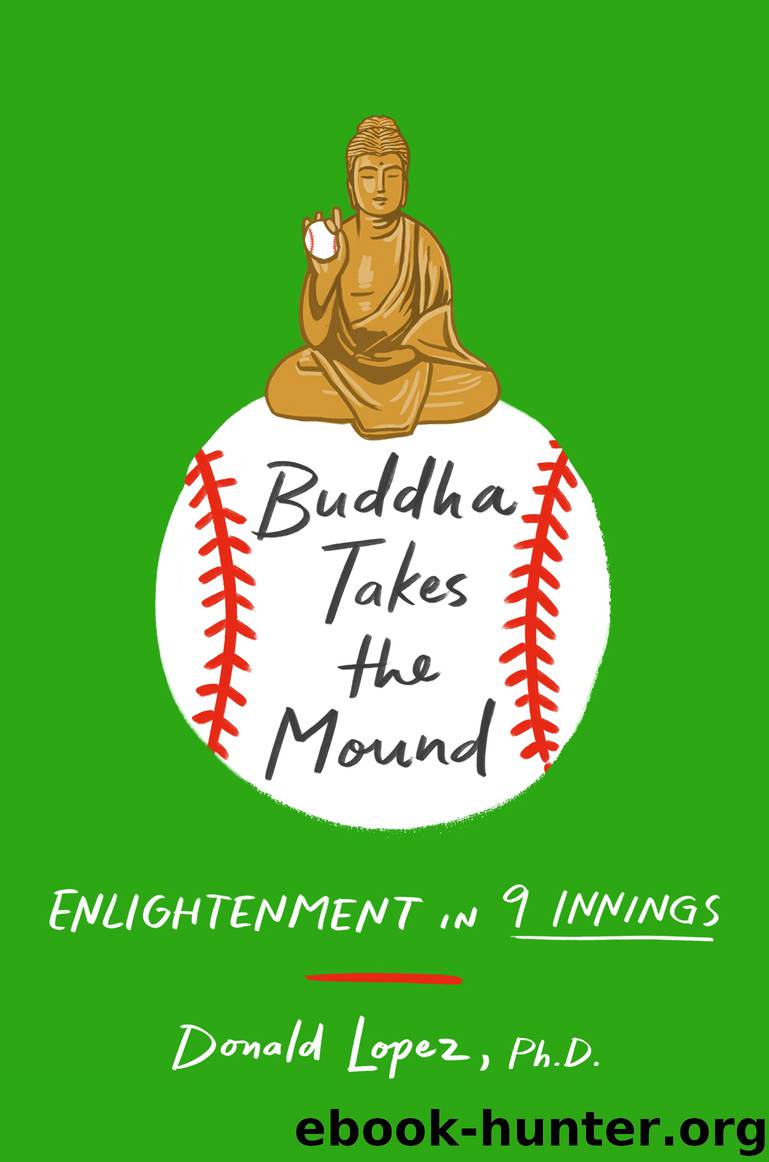Buddha Takes the Mound by Donald S. Lopez Jr. Ph.D

Author:Donald S. Lopez, Jr., Ph.D.
Language: eng
Format: epub
Publisher: St. Martin's Publishing Group
Commentary
How do we explain the inexplicable? Why do things go wrong? Why do the evil prosper? Why does suffering befall the good? These are questions that humans have pondered since the beginning of time and that all religions seek to answer. For the theistic religions, such things are often said to be the will of God, unknowable by mere mortals. In Buddhism, there is no creator God who blesses the virtuous and damns the sinful. There is, instead, the inexorable law of karma. As discussed in chapter three, the Sanskrit word karma simply means “action” or “deed,” but in both Hinduism and Buddhism it takes on a more specific meaning, referring to a kind of natural law of the universe in which virtuous deeds cause happiness in the future and evil deeds cause suffering in the future.
In Buddhism, it is said that everything that happens to us in each of our innumerable lifetimes in the past, individually and collectively, is the result of our past deeds: whether we are reborn as a human or an animal, in heaven or in hell—if a human, our birthplace, our parents, our gender, our appearance, and our intelligence; if an animal, our species, and whether we are predator or prey.
This “law of karma,” as it is sometimes called, thus explains everything about the present, but it does not allow us to predict the future. This is because we have no control over which deed from among the infinite deeds we have performed in the past will create what will befall us in the next moment. The experience of the next moment may be caused by something we did yesterday or by something we did eons ago. In many ways, it is a doctrine of individual responsibility, allowing us to take the credit for our fortune and forcing us to take the blame for our failure—but only in a general sense, because exactly what we did when to cause us happiness or despair is unknown to the unenlightened.
It is said that on the night of his enlightenment, the Buddha had a vision of all of his past lives, remembering each of them—although they were infinite in number—in specific detail. It is also said that the Buddha knows the past deeds of all the beings in the universe, allowing him to identify the deeds done in the past that explain why something has happened in the present. And because he knows how the seeds of past deeds will fructify, he can also predict the future.
One of the most popular forms of Buddhist literature is the so-called birth stories, in which the Buddha recounts events from his past lives, sometimes as a human and sometimes as an animal. In these stories, the future Buddha is the protagonist, often a generous king or a brave animal who sacrifices his own welfare for others. The Buddha’s own disciples are often characters in the story, demonstrating their long karmic connection to the Buddha. The Buddha’s evil cousin, who attempted to
Download
This site does not store any files on its server. We only index and link to content provided by other sites. Please contact the content providers to delete copyright contents if any and email us, we'll remove relevant links or contents immediately.
Machine Learning at Scale with H2O by Gregory Keys | David Whiting(4289)
Never by Ken Follett(3930)
Liar's Poker by Michael Lewis(3436)
The Ultimate Backcountry Survival Manual by Aram Von Benedikt; Editors of Outdoor Life;(3255)
Will by Will Smith(2901)
The Partner by John Grisham(2393)
Can't Hurt Me: Master Your Mind and Defy the Odds - Clean Edition by David Goggins(2319)
Friends, Lovers, and the Big Terrible Thing by Matthew Perry(2211)
Taste by Kris Bryant(1857)
HBR's 10 Must Reads 2022 by Harvard Business Review(1832)
A Short History of War by Jeremy Black(1831)
A Game of Thrones (The Illustrated Edition) by George R. R. Martin(1706)
Never Finished: Unshackle Your Mind and Win the War Within by David Goggins(1694)
515945210 by Unknown(1660)
The Arm by Jeff Passan(1604)
Why We Love Baseball by Joe Posnanski(1592)
443319537 by Unknown(1541)
The Dodgers by Schiavone Michael;(1527)
The Yogi Book by Yogi Berra(1520)
